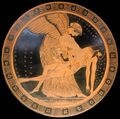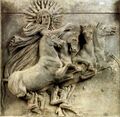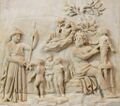Religion:List of Greek mythological figures
The following is a list of gods, goddesses, and many other divine and semi-divine figures from ancient Greek mythology and ancient Greek religion.
Immortals
The Greeks created images of their deities for many purposes. A temple would house the statue of a god or goddess, or multiple deities, and might be decorated with relief scenes depicting myths. Divine images were common on coins. Drinking cups and other vessels were painted with scenes from Greek myths.
Major gods and goddesses
| Deity | Description |
|---|---|
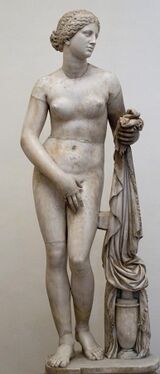
|
Aphrodite (Ἀφροδίτη, Aphroditē)
Goddess of beauty, love, desire, and pleasure. In Hesiod's Theogony (188–206), she was born from sea-foam and the severed genitals of Uranus; in Homer's Iliad (5.370–417), she is daughter of Zeus and Dione. She was married to Hephaestus, but bore him no children. She had many lovers, most notably Ares, to whom she bore Harmonia, Phobos, and Deimos. She was also a lover to Adonis and Anchises, to whom she bore Aeneas. She is usually depicted as a naked or semi-nude beautiful woman. Her symbols include the magical girdle, myrtle, roses, and the scallop shell. Her sacred animals include doves and sparrows. Her Roman counterpart is Venus.[1] |
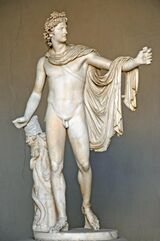
|
Apollo (Ἀπόλλων, Apóllōn)
God of music, arts, knowledge, healing, plague, prophecy, poetry, manly beauty, and archery. He is the son of Zeus and Leto, and the twin brother of Artemis. Both Apollo and Artemis use a bow and arrow. Apollo is depicted as young, beardless, handsome and athletic. In myth, he can be cruel and destructive, and his love affairs are rarely happy. He is often accompanied by the Muses. His most famous temple is in Delphi, where he established his oracular shrine. His signs and symbols include the laurel wreath, bow and arrow, and lyre. His sacred animals include roe deer, swans, and pythons. Some late Roman and Greek poetry and mythography identifies him as a sun-god, equivalent to Roman Sol and Greek Helios.[2] |

|
Ares (Ἄρης, Árēs)
God of courage, war, bloodshed, and violence. The son of Zeus and Hera, he was depicted as a beardless youth, either nude with a helmet and spear or sword, or as an armed warrior. Homer portrays him as moody and unreliable, and as being the most unpopular god on earth and Olympus (Iliad 5.890–1). He generally represents the chaos of war in contrast to Athena, a goddess of military strategy and skill. Ares is known for cuckolding his brother Hephaestus, conducting an affair with his wife Aphrodite. His sacred animals include vultures, venomous snakes, dogs, and boars. His Roman counterpart Mars by contrast was regarded as the dignified ancestor of the Roman people.[3] |

|
Artemis (Ἄρτεμις, Ártemis)
Virgin goddess of the hunt, wilderness, animals, the Moon and young girls. Both she and Apollo are archery gods. She is the daughter of Zeus and Leto, and twin sister of Apollo. In art she is often depicted as a young woman dressed in a short knee-length chiton and equipped with a silver hunting bow and a quiver of arrows. Her attributes include hunting knives and spears, animal pelts, deer and other wild animals. Her sacred animal is a deer. Her Roman counterpart is Diana.[4] |
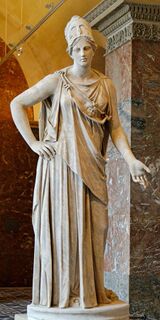
|
Athena (Ἀθηνᾶ, Athēnâ)
Goddess of reason, wisdom, intelligence, skill, peace, warfare, battle strategy, and handicrafts. According to most traditions, she was born from Zeus's forehead, fully formed and armored, after Zeus swallowed her mother, Metis, whole. She is depicted as being crowned with a crested helm, armed with shield and spear, and wearing the aegis over a long dress. Poets describe her as "grey-eyed" or having especially bright, keen eyes. She is a special patron of heroes such as Odysseus. She is the patron of the city Athens (from which she takes her name) and is attributed to various inventions in arts and literature. Her symbol is the olive tree. She is commonly shown as being accompanied by her sacred animal, the owl. Her Roman counterpart is Minerva.[5] |
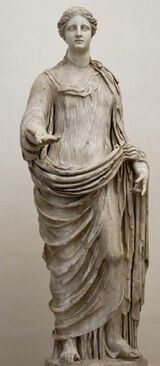
|
Demeter (Δημήτηρ, Dēmḗtēr)
Goddess of grain, agriculture, harvest, growth, and nourishment. Demeter, whose Roman counterpart is Ceres, is a daughter of Cronus and Rhea, and was swallowed and then regurgitated by her father. She is a sister of Zeus, by whom she bore Persephone, who is also known as Kore, i.e. "the girl." One of the central myths associated with Demeter involves Hades' abduction of Persephone and Demeter's lengthy search for her. Demeter is one of the main deities of the Eleusinian Mysteries, in which the rites seemed to center around Demeter's search for and reunion with her daughter, which symbolized both the rebirth of crops in spring and the rebirth of the initiates after death. She is depicted as a mature woman, often crowned and holding sheafs of wheat and a torch.[6] Her symbols are the cornucopia, wheat-ears, the winged serpent, and the lotus staff. Her sacred animals include pigs and snakes. |
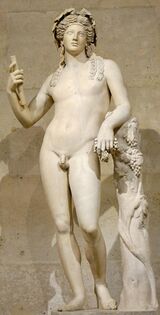
|
Dionysus (Διόνυσος, Diónusos)
God of wine, fruitfulness, parties, festivals, madness, chaos, drunkenness, vegetation, ecstasy, and the theater. He is the twice-born son of Zeus and Semele, in that Zeus snatched him from his mother's womb and stitched Dionysus into his own thigh and carried him until he was ready to be born. In art he is depicted as either an older bearded god (particularly before 430 BC) or an effeminate, long-haired youth (particularly after 430 BC). His attributes include the thyrsus, a drinking cup, the grape vine, and a crown of ivy. He is often in the company of his thiasos, a group of attendants including satyrs, maenads, and his old tutor Silenus. The consort of Dionysus was Ariadne. It was once held that Dionysius was a later addition to the Greek pantheon, but the discovery of Linear B tablets confirm his status as a deity from an early period. Bacchus was another name for him in Greek, and came into common usage among the Romans.[7] His sacred animals include dolphins, serpents, tigers, and donkeys. |
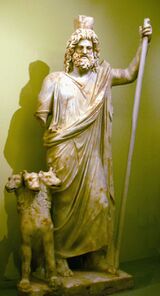
|
Hades (ᾍδης, Háidēs)/Pluto (Πλούτων, Ploutōn)
King of the underworld and the dead. He is also a god of wealth. His consort is Persephone. His attributes are the drinking horn or cornucopia, key, sceptre, and the three-headed dog Cerberus. His sacred animals include the screech owl. He was one of three sons of Cronus and Rhea, and thus sovereign over one of the three realms of the universe, the underworld. As a chthonic god, however, his place among the Olympians is ambiguous. In the mystery religions and Athenian literature, Plouton ("the Rich one") was his preferred name, because of the idea that all riches came from the earth. The term Hades was used in this literature to refer to the underworld itself. The Romans translated Plouton as Dis Pater ("the Rich Father") or Pluto.[8] |
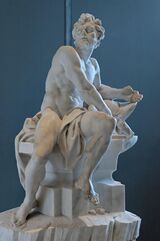
|
Hephaestus (Ἥφαιστος, Hḗphaistos)
God of fire, metalworking, and crafts. Either the son of Zeus and Hera or Hera alone, he is the smith of the gods and the husband of the adulterous Aphrodite. He was usually depicted as a bearded, crippled man with hammer, tongs, and anvil, and sometimes riding a donkey. His sacred animals include the donkey, the guard dog, and the crane. Among his creations was the armor of Achilles. Hephaestus used the fire of the forge as a creative force, but his Roman counterpart Vulcan was feared for his destructive potential and associated with the volcanic power of the earth. |
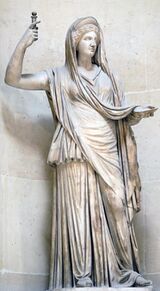
|
Hera (Ἥρα, Hḗra)
Queen of the gods, and goddess of women, marriage, childbirth, heirs, kings, and empires. She is the goddess of the sky, the wife and sister of Zeus, and the daughter of Cronus and Rhea. She was usually depicted as a regal woman in the prime of her life, wearing a diadem and veil and holding a lotus-tipped staff. Although she is the goddess of marriage, Zeus's many infidelities drive her to jealousy and vengefulness. Her sacred animals include the heifer, the peacock, and the cuckoo. Her Roman counterpart is Juno. |
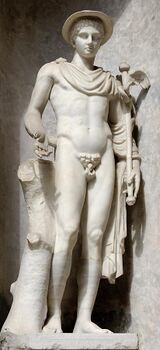
|
Hermes (Ἑρμῆς, Hērmês)
God of boundaries, travel, trade, communication, language, writing, cunning and thieves. Hermes was also responsible for protecting livestock and presided over the spheres associated with fertility, music, luck, and deception.[9] The son of Zeus and Maia, Hermes is the messenger of the gods, and a psychopomp who leads the souls of the dead into the afterlife. He was depicted either as a handsome and athletic beardless youth, or as an older bearded man. His attributes include the herald's wand or caduceus, winged sandals, and a traveler's cap. His sacred animals include the tortoise. His Roman counterpart is Mercury. |
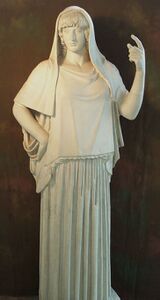
|
Hestia (Ἑστία, Hestía)
Virgin goddess of the hearth, home, domesticity and chastity. She is a daughter of Rhea and Cronus, and a sister of Zeus. Not often identifiable in Greek art, she appeared as a modestly veiled woman. Her symbols are the hearth and kettle. She plays little role in Greek myths, and although she is omitted in some lists of the twelve Olympians in favour of Dionysus, no ancient tale tells of her abdicating or giving her seat to Dionysus.[10] Her Roman counterpart Vesta, however, was a major deity of the Roman state. |
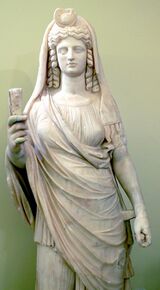
|
Persephone (Περσεφόνη, Persephónē)
Goddess of spring, Queen of the Underworld, wife of Hades and daughter of Demeter and Zeus. Her symbols include the pomegranate, grain, torches, wheat and the asphodelus. After her abduction by Hades, she was forced to split the year between the world of the dead with her husband and the world of the living with her mother. She was worshipped in conjunction with Demeter, especially in the Eleusinian Mysteries. In ancient art she is usually depicted as a young woman, usually in the scene of her abduction. |
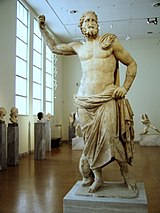
|
Poseidon (Ποσειδῶν, Poseidôn)
God of the sea, rivers, floods, droughts, and earthquakes. He is a son of Cronus and Rhea, and the brother of Zeus and Hades. He rules one of the three realms of the universe, as king of the sea and the waters. In art he is depicted as a mature man of sturdy build, often with a luxuriant beard, and holding a trident. His sacred animals include the horse and the dolphin. His wedding with Amphitrite is often presented as a triumphal procession. In some stories he rapes Medusa, leading to her transformation into a hideous Gorgon and also to the birth of their two children, Pegasus and Chrysaor. His Roman counterpart is Neptune. |
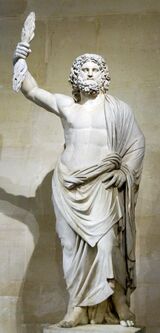
|
Zeus (Ζεύς, Zeús)
King of the gods, ruler of Mount Olympus, and god of the sky, weather, thunder, lightning, law, order, and justice. He is the youngest son of Cronus and Rhea. He overthrew Cronus and gained the sovereignty of heaven for himself. In art he is depicted as a regal, mature man with a sturdy figure and dark beard. His usual attributes are the royal scepter and the lightning bolt. His sacred animals include the eagle and the bull. His Roman counterpart is Jupiter, also known as Jove. |
Greek primordial deities
| Ancient Greek name | English name | Description |
|---|---|---|
| Ἀχλύς (Akhlús) | Achlys | The goddess of poisons, and the personification of misery and sadness. Said to have existed before Chaos itself. |
| Αἰθήρ (Aithḗr) | Aether | The god of light and the upper atmosphere. |
| Αἰών (Aiōn) | Aion | The god of eternity, personifying cyclical and unbounded time. Sometimes equated with Chronos. |
| Ἀνάγκη (Anánkē) | Ananke | The goddess of inevitability, compulsion, and necessity. |
| Χάος (Kháos) | Chaos | The personification of nothingness from which all of existence sprang. Depicted as a void. Initially genderless, later on described as female. |
| Χρόνος (Khrónos) | Chronos | The god of empirical time, sometimes equated with Aion. Not to be confused with the Titan Cronus (Kronos), the father of Zeus. |
| Ἔρεβος (Érebos) | Erebus | The god of darkness and shadow, as well as the void that existed between Earth and the Underworld. |
| Ἔρως (Érōs) | Eros | The god of love and attraction. |
| Γαῖα (Gaîa) | Gaia | Personification of the Earth (Mother Earth); mother of the Titans. |
| Ἡμέρα (Hēméra) | Hemera | The personification of the day. |
| Νῆσοι (Nêsoi) | The Nesoi | The goddesses of islands. |
| Νύξ (Núx) | Nyx | The goddess and personification of the night. |
| Οὔρεα (Oúrea) | The Ourea | The gods of mountains. |
| Φάνης (Phánēs) | Phanes | The god of procreation in the Orphic tradition. |
| Πόντος (Póntos) | Pontus | The god of the sea, father of the fish and other sea creatures. |
| Τάρταρος (Tártaros) | Tartarus | The god of the deepest, darkest part of the underworld, the Tartarean pit (which is also referred to as Tartarus itself). |
| Θάλασσα (Thálassa) | Thalassa | Personification of the sea and consort of Pontus. |
| Οὐρανός (Ouranós) | Uranus | The god of the heavens (Father Sky); father of the Titans. |
Titans and Titanesses
The Titan gods and goddesses are depicted in Greek art less commonly than the Olympians.
| Greek name | English name | Description |
|---|---|---|
| The Twelve Titans | ||
| Κοῖος (Koîos) | Coeus | God of intellect and the axis of heaven around which the constellations revolved. |
| Κρεῖος (Kreîos) | Crius | The least individualized of the Twelve Titans, he is the father of Astraeus, Pallas, and Perses. Implied to be the god of constellations. |
| Κρόνος (Krónos) | Cronus | God of harvests and personification of destructive time. The leader of the Titans, who overthrew his father Uranus only to be overthrown in turn by his son, Zeus. Not to be confused with Chronos. |
| Ὑπερίων (Hyperíōn) | Hyperion | God of light. With Theia, he is the father of Helios (the Sun), Selene (the Moon), and Eos (the Dawn). |
| Ἰαπετός (Iapetós) | Iapetus | God of mortality and father of Prometheus, Epimetheus, Menoetius, and Atlas. |
| Mνημοσύνη (Mnēmosýnē) | Mnemosyne | Goddess of memory and remembrance, and mother of the Nine Muses. |
| Ὠκεανός (Ōceanós) | Oceanus | God of the all-encircling river Oceans around the Earth, the fount of all the Earth's fresh-water. |
| Φοίβη (Phoíbē) | Phoebe | Goddess of the "bright" intellect and prophecy, and consort of Coeus. |
| Ῥέα (Rhéa) | Rhea | Goddess of fertility, motherhood and the mountain wilds. She is the sister and consort of Cronus, and mother of Zeus, Hades, Poseidon, Hera, Demeter, and Hestia. |
| Τηθύς (Tēthýs) | Tethys | Goddess of fresh-water, and the mother of the rivers, springs, streams, fountains, and clouds. |
| Θεία (Theía) | Theia | Goddess of sight and the shining light of the clear blue sky. She is the consort of Hyperion, and mother of Helios, Selene, and Eos. |
| Θέμις (Thémis) | Themis | Goddess of divine law and order. |
| Other Titans | ||
| Ἄνυτος (Ánytos) | Anytos | God who reared the young goddess Despoina, the daughter of Demeter. |
| Ἀστερία (Astería) | Asteria | Goddess of nocturnal oracles and falling stars. |
| Ἀστραῖος (Astraîos) | Astraeus | God of dusk, stars, and planets, and the art of astrology. |
| Ἄτλας (Átlas) | Atlas | God forced to carry the heavens upon his shoulders by Zeus. Presumed to be the god of endurance and astronomy. Also Son of Iapetus. |
| Διώνη (Diṓnē) | Dione | Goddess of the oracle of Dodona. |
| Ἥλιος (Hḗlios) | Helios | God of the Sun and guardian of oaths. |
| Ἠώς (Ēṓs) | Eos | Goddess of the Dawn. |
| Ἐπιμηθεύς (Epimētheús) | Epimetheus | God of afterthought and the father of excuses. |
| Λήλαντος (Lēlantos) | Lelantos | God of moving unseen and The father of the nymph Aura by Periboea |
| Λητώ (Lētṓ) | Leto | Goddess of motherhood and mother of the twin Olympians, Artemis and Apollo. |
| Μενοίτιος (Menoítios) | Menoetius | God of violent anger, rash action, and human mortality. Killed by Zeus. |
| Μῆτις (Mē̂tis) | Metis | Goddess of good counsel, advice, planning, cunning, craftiness, and wisdom. Mother of Athena. |
| Πάλλας (Pállas) | Pallas | God of warcraft. He was killed by Athena during the Titanomachy. |
| Πέρσης (Pérsēs) | Perses | Son of Crius and Eurybia. |
| Προμηθεύς (Promētheús) | Prometheus | God of forethought and crafty counsel, and creator of mankind. |
| Σελήνη (Selḗnē) | Selene | Goddess of the Moon. |
| Στύξ (Stýx) | Styx | Goddess of the Underworld river Styx and personification of hatred. |
| Συκεύς (Sykeús) | Syceus | God whom Gaia turned into a fig tree to help him escape from Zeus. |
| Τιτὰν (Titan) | Titan | God of The calendar of the seasons brother of Helios, usually just Helios himself |
Gigantes
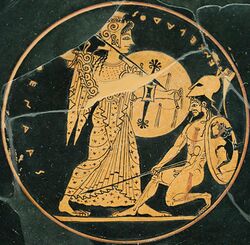
The Gigantes were the offspring of Gaia (Earth), born from the blood that fell when Uranus (Sky) was castrated by their Titan son Cronus, who fought the Gigantomachy, their war with the Olympian gods for supremacy of the cosmos, they include:
- Alcyoneus (Ἀλκυονεύς), a giant usually considered to be one of the Gigantes, slain by Heracles.
- Chthonius (Χθόνιος).
- Damysus (Δάμυσος), the fastest of all the Giants in Greek mythology.
- Enceladus (Ἐγκέλαδος), typically slain by Athena, said to be buried under Mount Etna in Sicily.
- Mimas (Μίμας), according to Apollodorus, he was killed by Hephaestus, or by others Zeus or Ares.
- Pallas (Πάλλας), according to Apollodorus, he was flayed by Athena, who used his skin as a shield.
- Picolous (Πικόλοος), who fled the battle but was slain by Helios.
- Polybotes (Πολυβώτης), typically slain by Poseidon.
- Porphyrion (Πορφυρίων), one of the leaders of the Gigantes, typically slain by Zeus.
- Thoas/Thoon (Θόων), he was killed by the Moirai.
Other "giants"
- Aloadae (Ἀλῳάδαι), twin giants who attempted to climb to Olympus by piling mountains on top of each other.
- Otus or Otos (Ότος).
- Ephialtes (Εφιάλτης).
- Anax (Αναξ) was a giant of the island of Lade near Miletos in Lydia, Anatolia.
- Antaeus (Ἀνταῖος), a Libyan giant who wrestled all visitors to the death until he was slain by Heracles.
- Antiphates (Ἀντιφάτης), the king of the man-eating giants known as Laestrygones which were encountered by Odysseus on his travels.
- Argus Panoptes (Ἄργος Πανόπτης), a hundred-eyed giant tasked with guarding Io.
- Asterius (Αστεριος), a Lydian giant.
- Cacus (Κακος), a fire-breathing Latin giant slain by Heracles.
- Cyclopes (Hesiodic), three one-eyed giants who forged the lightning bolts of Zeus, Trident of Poseidon, and Helmet of Hades.
- Arges (Ἄργης).
- Brontes (Βρόντης).
- Steropes (Στερόπης).
- Cyclopes (Homeric), a tribe of one-eyed, man-eating giants who herded flocks of sheep on the island of Sicily.
- Polyphemus (Πολύφημος), a Cyclops who briefly captured Odysseus and his men, only to be overcome and blinded by the hero.
- The Gegenees (Γηγενέες), a tribe of six-armed giants fought by the Argonauts on Bear Mountain in Mysia.
- Geryon (Γηρυων), a three-bodied giant who dwelt on the sunset isle at the ends of the earth. He was slain by Heracles when the hero arrived to fetch the giant's cattle as one of his twelve labours.
- The Hekatoncheires (Ἑκατόγχειρες), or Centimanes (Latin), the Hundred-Handed Ones, giant gods of violent storms and hurricanes. Three sons of Uranus and Gaia, each with his own distinct characters.[12]
- Briareus (Βριάρεως) or Aigaion (Αἰγαίων), The Vigorous.
- Cottus (Κόττος), The Furious.
- Gyges (Γύγης), The Big-Limbed.
- The Laestrygonians (Λαιστρυγόνες), a tribe of man-eating giants encountered by Odysseus on his travels.
- Orion (Ὠρίων), a giant huntsman whom Zeus placed among the stars as the constellation of Orion.
- Talos (Τάλως), a giant forged from bronze by Hephaestus, and given by Zeus to his lover Europa as her personal protector.
- Tityos (Τίτυος), a giant slain by Apollo and Artemis when he attempted to violate their mother Leto.
- Typhon (Τυφῶν), a monstrous immortal storm-giant who attempted to launch an attack on Mount Olympus but was defeated by the Olympians and imprisoned in the pits of Tartarus.
Personified concepts
Chthonic deities
Sea deities
Sky deities
- Aeolus (Aiolos) (Αίολος), god of the winds
- Aether (Αιθήρ), primeval god of the upper air
- Alectrona (Αλεκτρονα), solar goddess of the morning or waking up
- Anemoi, (Άνεμοι), gods of the winds
- Aparctias (Απαρκτίας), another name for the north wind (not identified with Boreas)
- Apheliotes (Αφηλιώτης), god of the east wind (when Eurus is considered southeast)
- Argestes (Αργέστης), another name for the west or northwest wind
- Boreas (Βορέας), god of the north wind and of winter
- Caicias (Καικίας), god of the northeast wind
- Circios (Κίρκιος) or Thraskias (Θρασκίας), god of the north-northwest wind
- Euronotus (Ευρονότος), god of the southeast wind
- Eurus (Εύρος), god of the unlucky east or southeast wind
- Lips (Λίψ), god of the southwest wind
- Notus (Νότος) god of the south wind
- Skeiron (Σκείρων), god of the northwest wind
- Zephyrus (Ζέφυρος), god of the west wind
- Arke (Άρκη), messenger of the Titans and sister of Iris
- Astraios (Ἀστραῖος), god of stars and planets, and the art of astrology
- The Astra Planeti (Αστρα Πλανετοι), gods of the five wandering stars or planets
- Stilbon (Στιλβών), god of Hermaon, the planet Mercury
- Eosphorus (Ηωσφόρος), god of Venus the morning star
- Hesperus (Ἓσπερος), god of Venus the evening star
- Pyroeis (Πυρόεις), god of Areios, the planet Mars
- Phaethon (Φαέθων), god of Dios, the planet Jupiter
- Phaenon (Φαίνων), god of Kronion, the planet Saturn
- Astrape and Bronte, goddesses of lightning and thunder respectively
- Aurai (Αὖραι), nymphs of the cooling breeze
- Aura (Αὖρα), goddess of the breeze and the fresh, cool air of early morning
- Chione (Χιόνη), goddess of snow and daughter of Boreas
- Eos (Ἠώς), goddess of the Dawn
- Ersa (Ἕρση), goddess of the morning dew
- Helios (Ἥλιος), god of the Sun and guardian of oaths
- Hemera (Ημέρα), primeval goddess of the day
- Hera (Ήρα), queen of the gods
- The Hesperides, (´Εσπερίδες), nymphs of the evening and sunset
- Iris (Ίρις), goddess of the rainbow and divine messenger
- Men (Μήν), a lunar deity worshiped in the western interior parts of Anatolia
- Nephele (Νεφέλη), cloud nymph
- Nyx, (Νύξ), goddess of night
- Pandia (Πανδία), daughter of Selene and Zeus
- The Pleiades (Πλειάδες), goddesses of the star cluster Pleiades and were associated with rain
- Sabazios (Σαβάζιος), the nomadic horseman and sky father god of the Phrygians and Thracians
- Selene (Σελήνη), goddess of the Moon
- Uranus (Ουρανός), primeval god of the heavens
- Zeus (Ζεύς), King of Heaven and god of the sky, clouds, thunder, and lightning
Rustic deities
- Aetna (Αἴτνη), goddess of the volcanic Mount Etna in Sicily
- Agreus and Nomios two goat-legged daimones of hunting & hurding
- Amphictyonis (Αμφικτυονίς), goddess of wine and friendship between nations, a local form of Demeter
- Anthousai (Ανθούσαι), flower nymphs
- Aristaeus (Ἀρισταῖος), god of bee-keeping, cheese-making, herding, olive-growing, and hunting
- Attis (Άττις), vegetation god and consort of Cybele
- Britomartis (Βριτόμαρτις), Cretan goddess of hunting and nets used for fishing, fowling and the hunting of small game
- Meliseus, god of bees and bee-keeping in Crete.
- Cabeiri (Κάβειροι), gods or spirits who presided over the Mysteries of the islands of Lemnos and Samothrace
- Aitnaios (Αιτναιος)
- Alkon (Αλκων)
- Eurymedon (Ευρυμεδών)
- Onnes (Όννης)
- Tonnes (Τόννης)
- Chloris (Χλωρίς), minor flower nymph and wife of Zephyrus
- Comus (Κόμος), god of revelry, merrymaking, and festivity
- Corymbus (Κόρυμβος), god of the fruit of the ivy
- The Curetes (Κουρέτες), guardians of infant Zeus on Mount Ida, barely distinguished from the Dactyls and the Corybantes
- Cybele (Κυβέλη), a Phrygian mountain goddess
- The Dactyls (Δάκτυλοι) "fingers", minor deities originally representing fingers of a hand
- Acmon (Ακμών)
- Damnameneus (Δαμναμενεύς)
- Delas (Δήλας)
- Epimedes (Επιμήδης)
- Heracles (not to be confused with the hero Heracles)
- Iasios (Ιάσιος)
- Kelmis (Κελμις)
- Skythes (Σκύθης)
- companions of Cybele
- Titias (Τιτίας)
- Cyllenus (Κύλληνος)
- Dionysus (Διόνυσος), god of wine, drunken orgies, and wild vegetation
- Dryades (Δρυάδες), tree and forest nymphs
- Gaia (Γαία), primeval goddess of the earth
- Epimeliades (Επιμελίδες), nymphs of highland pastures and protectors of sheep flocks
- Hamadryades (Αμαδρυάδες), oak tree dryades
- Hecaterus (Ηεκατερος), minor god of the hekateris — a rustic dance of quickly moving hands — and perhaps of the skill of hands in general
- Hermes (Ερμής), god of herds and flocks, of roads and boundary stones, and the god of thieves
- Korybantes (Κορύβαντες), the crested dancers who worshipped Cybele
- Damneus (Δαμνεύς) "the one who tames(?)"
- Idaios (Ιδαίος) "of Mount Ida"
- Kyrbas (Κύρβας), whose name is probably a variant of Korybas, singular for "Korybantes"
- Okythoos (Ωκύθοος) "the one running swiftly"
- Prymneus (Πρυμνεύς) "of lower areas(?)"
- Pyrrhichos (Πυρῥιχος), god of the rustic dance
- Ma, a local goddess at Comana in Cappadocia
- Maenades (μαινάδες), crazed nymphs in the retinue of Dionysus
- Methe (Μέθη), nymph of drunkenness
- Meliae (Μελίαι), nymphs of honey and the ash tree
- Naiades (Ναιάδες), fresh water nymphs
- The Nymphai Hyperboreioi (Νύμφαι Υπερβόρειοι), who presided over aspects of archery
- Hekaerge (Εκαέργη), represented distancing
- Loxo (Λοξώ), represented trajectory
- Oupis (Ουπις), represented aim
- Oreades (Ὀρεάδες), mountain nymphs
- The Ourea (Ούρος), primeval gods of mountains
- The Palici (Παλικοί), a pair of rustic gods who presided over the geysers and thermal springs in Sicily
- Pan (Πάν), god of shepherds, pastures, and fertility
- Pan Sybarios (Παν Συβαριος) god of Woods and vales
- Phaunos god of forests not identified with Faunus
- Potamoi (Ποταμοί), river gods
- Achelous (Αχέλους)
- Acis (Άκις)
- Alpheus (Αλφειός)
- Asopus (Ασωπός)
- Cladeus (Κλάδεος)
- Eurotas (Ευρώτας)
- Nilus (Νείλος)
- Peneus (Πηνειός)
- Scamander (Σκάμανδρος)
- For a more complete list, see Potamoi#List of potamoi
- Priapus (Πρίαπος), god of garden fertility
- Satyrs (Σάτυροι) / Satyress, rustic fertility spirits
- Krotos (Κρότος), a great hunter and musician who kept the company of the Muses on Mount Helicon
- Silenus (Σειληνός), an old rustic god of the dance of the wine-press
- Telete (Τελέτη), goddess of initiation into the Bacchic orgies
- Zagreus (Ζαγρεύς), in the Orphic mysteries, the first incarnation of Dionysus
Agricultural deities
- Adonis (Άδωνις), a life-death-rebirth deity
- Aphaea (Αφαία), minor goddess of agriculture and fertility
- Cyamites (Κυαμίτης), demi-god of the bean
- Demeter (Δημήτηρ), goddess of fertility, agriculture, grain, and harvest
- Despoina (Δέσποινη), daughter of Poseidon and Demeter, goddess of mysteries in Arcadia
- Dionysus (Διόνυσος), god of viticulture and wine
- Eunostus (Εύνοστος), goddess of the flour mill
- Opora, goddess of autumn and wine
- Persephone (Περσεφόνη), queen of the underworld, wife of Hades and goddess of spring growth
- Philomelus (Φιλόμελος), agricultural demi-god inventor of the wagon and the plough
- Plutus (Πλοῦτος), god of wealth, including agricultural wealth, son of Demeter
- Promylaia (Προμυλαια) a goddess of the flower mill
- Triptolemus (Τριπτόλεμος), god of farming and agriculture, he brought agriculture to Greece
- Trokhilos (Τροχιλος) god of the mill stone
Health deities
- Apollo (Ἀπόλλων), god of archery, music and dance, truth and prophecy, healing and diseases, the Sun and light, poetry, and more.
- Asclepius (Ασκληπιός), god of medicine
- Aceso (Ἀκεσώ), goddess of the healing of wounds and the curing of illnesses
- Aegle (Αἴγλη), goddess of radiant good health
- Chiron (Χείρων), god of healing (up for debate if it is a god)
- Darrhon (Δάρρων), Macedonian god of health
- Epione (Ἠπιόνη), goddess of the soothing of pain
- Hygieia (Ὑγεία), goddess of cleanliness and good health
- Iaso (Ἰασώ), goddess of cures, remedies, and modes of healing
- Paean (Παιάν), physician of the gods
- Panacea (Πανάκεια), goddess of healing
- Telesphorus (Τελεσφόρος), demi-god of convalescence, who "brought to fulfillment" recuperation from illness or injury
Sleep deities
- Empusa (Ἔμπουσα), goddess of shape-shifting
- Epiales (Ἐφιάλτης), goddess of nightmares
- Hypnos (Ὕπνος) god of sleep
- Pasithea (Πασιθέα) goddess of relaxing meditation and hallucinations
- Oneiroi (Ὀνείρων) god of dreams
- Morpheus (μορφή) god of dreaming
Charities
- Charites (Χάριτες), goddesses of charm, beauty, nature, human creativity, and fertility
- Aglaea (Αγλαΐα), goddess of beauty, adornment, splendor, and glory
- Euphrosyne (Εὐφροσύνη), goddess of good cheer, joy, mirth, and merriment
- Thalia (Θάλεια), goddess of festive celebrations and rich and luxurious banquets
- Hegemone (Ηγεμόνη) "mastery"
- Antheia (Άνθεια), goddess of flowers and flowery wreaths
- Pasithea (Πασιθέα), goddess of rest and relaxation
- Cleta (Κλήτα) "the glorious"
- Phaenna (Φαέννα) "the shining"
- Eudaimonia (Ευδαιμονία) "happiness"
- Euthymia (Ευθυμία) "good mood"
- Calleis (Καλλείς) "beauty"
- Paidia (Παιδία) "play, amusement"
- Pandaisia (Πανδαισία) "banquet for everyone"
- Pannychis (Παννυχίς) "all-night (festivity)"
Horae
- The Horae (Ώρες), The Hours, the goddesses of natural order
- Eunomia (Ευνομία), spirit of good order, and springtime goddess of green pastures
- Dike (Δίκη), spirit of justice, may have represented springtime growth
- Eirene (Ειρήνη), spirit of peace and goddess of the springtime
- The goddesses of springtime growth
- Thallo (Θαλλώ), goddess of spring buds and shoots, identified with Eirene
- Auxo (Αυξώ), goddess of spring growth
- Karpo (Καρπώ), goddess of the fruits of the earth
- The goddesses of welfare
- Pherousa (Φέρουσα) "the bringer"
- Euporie (Ευπορίη) "abundance"
- Orthosie (Ορθοσίη) "prosperity"
- The goddesses of the natural portions of time and the times of day
- Auge (Αυγή), first light of the morning
- Anatole (Ανατολή) or Anatolia (Ανατολία), sunrise
- Mousika or Musica (Μουσική), the morning hour of music and study
- Gymnastika, Gymnastica (Γυμναστίκή) or Gymnasia (Γυμνασία), the morning hour of gymnastics/exercise
- Nymphe (Νυμφή), the morning hour of ablutions (bathing, washing)
- Mesembria (Μεσημβρία), noon
- Sponde (Σπονδή), libations poured after lunch
- Elete, prayer, the first of the afternoon work hours
- Akte, Acte (Ακτή) or Cypris (Κυπρίς), eating and pleasure, the second of the afternoon work hours
- Hesperis (Έσπερίς), evening
- Dysis (Δύσις), sunset
- Arktos (Άρκτος), night sky, constellation
- The goddesses of seasons of the year
- Eiar (Είαρ), spring
- Theros (Θέρος), summer
- Pthinoporon (Φθινόπωρον), autumn
- Cheimon (Χειμών), winter
Muses
| Name | |
|---|---|
| Titan Muses | |
| Aoide (Ἀοιδή) | muse of song |
| Arche (Αρχή) | muse of origins |
| Melete (Μελέτη) | muse of meditation and practice |
| Mneme (Μνήμη) | muse of memory |
| Thelxinoe (Θελξινόη) | muse "charmer of minds" |
| Olympian Muses, daughters of Zeus and Mnemosyne | |
| Calliope (Καλλιόπη) | muse of epic poetry |
| Clio (Κλειώ) | muse of history |
| Euterpe (Ευτέρπη) | muse of musical poetry |
| Erato (Ερατώ) | muse of lyric poetry |
| Melpomene (Μελπομένη) | muse of tragedy |
| Polyhymnia (Πολυμνία) or (Πολύμνια) | muse of sacred poetry |
| Terpsichore (Τερψιχόρη) | muse of dance and choral poetry |
| Thalia (Θάλεια) | muse of comedy and bucolic poetry |
| Urania (Ουρανία) | muse of astronomy |
| Muses worshiped at Delphi, daughters of Apollo | |
| Cephisso (Κεφισσώ) | also Hypate (Υπάτη), "the upper (chord of the lyre)" |
| Apollonis (Απολλωνίς) | also Mese (Μέση), "the middle (chord of the lyre)" |
| Borysthenis (Βορυσθενίς) | also Nete (Νήτη), "the lowest (chord of the lyre)" |
| Muses worshiped at Sicyon | |
| Polymatheia (Πολυμάθεια) | muse of knowledge |
Other deities
Deified mortals
- Achilles (Ἀχιλλεύς), hero of the Trojan War
- Aiakos (Αἰακός), a king of Aegina, appointed as a Judge of the Dead in the Underworld after his death
- Aeolus (Αἴολος), a king of Thessaly, made the immortal king of all the winds by Zeus
- Alabandus (Ἀλάβανδος), he was the founder of the town of Alabanda
- Amphiaraus (Ἀμφιάραος), a hero of the war of the Seven against Thebes who became an oracular spirit of the Underworld after his death
- Ariadne (Αριάδνη), a Cretan princess who became the immortal wife of Dionysus
- Aristaeus (Ἀρισταῖος), a Thessalian hero, his inventions saw him immortalised as the god of bee-keeping, cheese-making, herding, olive-growing, and hunting
- Asclepius (Ἀσκληπιός), a Thessalian physician who was struck down by Zeus for reviving the dead, to be later recovered by his father Apollo
- Attis (Ἄττις), a consort of Cybele, granted immortality as one of her attendants
- Bolina (Βολίνα), a mortal woman transformed into an immortal nymph by Apollo
- The Dioscuri (Διόσκουροι), divine twins
- Castor (Κάστωρ)
- Pollux (Πολυδεύκης)
- Endymion (Ἐνδυμίων), lover of Selene, granted eternal sleep so as never to age or die
- Ganymede (Γανυμήδης), a handsome Trojan prince, abducted by Zeus and made cup-bearer of the gods
- Glaucus (Γλαῦκος), the fisherman's sea god, made immortal after eating a magical herb
- Hemithea (Ἡμιθέα) and Parthenos (Παρθένος), princesses of the Island of Naxos who leapt into the sea to escape their father's wrath; Apollo transformed them into demi-goddesses
- Heracles (Ἡρακλῆς), ascended hero
- Ino (Ἰνώ), a Theban princess who became the sea goddess Leucothea
- Lampsace (Λαμψάκη), a semi-historical Bebrycian princess honored as goddess for her assistance to the Greeks
- The Leucippides (Λευκιππίδες), wives of the Dioscuri
- Phoebe (Φοίβη), wife of Pollux
- Hilaera (Ἱλάειρα), wife of Castor
- Minos (Μίνως), a king of Crete, appointed as a Judge of the Dead in the Underworld after his death
- Orithyia (Ὠρείθυια), an Athenian princess abducted by Boreas and made the goddess of cold, gusty mountain winds
- Palaemon (Παλαίμων), a Theban prince, made into a sea god along with his mother, Ino
- Philoctetes (Ancient Greek:), was the son of King Poeas of Meliboea in Thessaly, a famous archer, fought at the Trojan War
- Phylonoe (Φυλονόη), daughter of Tyndareus and Leda, made immortal by Artemis
- Psyche (Ψυχή), goddess of the soul
- Semele (Σεμελη), mortal mother of Dionysus, who later was made the goddess Thyone (Θυωνη)
- Tenes (Τέννης), was a hero of the island of Tenedos
Mortals
Heroes
- Abderus, aided Heracles during his eighth labour and was killed by the Mares of Diomedes
- Achilles (Αχιλλεύς or Αχιλλέας), hero of the Trojan War and a central character in Homer's Iliad
- Aeneas (Αινείας), a hero of the Trojan War and progenitor of the Roman people
- Ajax the Great (Αίας ο Μέγας), a hero of the Trojan War and king of Salamis
- Ajax the Lesser (Αίας ο Μικρός), a hero of the Trojan War and leader of the Locrian army
- Amphitryon (Αμφιτρύων), Theban general who rescued Thebes from the Teumessian fox; his wife was Alcmene, mother of Heracles
- Antilochus (Ἀντίλοχος), Son of Nestor sacrificed himself to save his father in the Trojan War along with other deeds of valor
- Bellerophon (Βελλεροφῶν), hero who slew the Chimera
- Bouzyges, a hero credited with inventing agricultural practices such as yoking oxen to a plough
- Castor, the mortal Dioscuri twin; after Castor's death, his immortal brother Pollux shared his divinity with him in order that they might remain together
- Chrysippus (Χρύσιππος), a divine hero of Elis
- Daedalus (Δαίδαλος), creator of the labyrinth and great inventor, until King Minos trapped him in his own creation
- Diomedes (Διομήδης), a king of Argos and hero of the Trojan War
- Eleusis (Ἐλευσῖνι or Ἐλευσῖνα), eponymous hero of the town of Eleusis
- Eunostus, a Boeotian hero
- Ganymede (Γανυμήδης), Trojan hero and lover of Zeus, who was given immortality and appointed cup-bearer to the gods
- Hector (Ἕκτωρ), hero of the Trojan War and champion of the Trojan people
- Icarus (Ἴκαρος), the son of the master craftsman Daedalus
- Iolaus (Ἰόλαος), nephew of Heracles who aided his uncle in one of his Labors
- Jason (Ἰάσων), leader of the Argonauts
- Meleager (Μελέαγρος), a hero who sailed with the Argonauts and killed the Calydonian boar
- Odysseus (Ὀδυσσεύς or Ὀδυσεύς), a hero and king of Ithaca whose adventures are the subject of Homer's Odyssey; he also played a key role during the Trojan War
- Orpheus (Ὀρφεύς), a legendary musician and poet who attempted to retrieve his dead wife from the Underworld
- Pandion (Πανδίων), the eponymous hero of the Attic tribe Pandionis, usually assumed to be one of the legendary Athenian kings Pandion I or Pandion II
- Perseus (Περσεύς), son of Zeus and the founder-king of Mycenae and slayer of the Gorgon Medusa
- Theseus (Θησεύς), son of Poseidon and a king of Athens and slayer of the Minotaur
Notable women
- Alcestis (Άλκηστις), daughter of Pelias and wife of Admetus, who was known for her devotion to her husband
- Amymone, the one daughter of Danaus who refused to murder her husband, thus escaping her sisters' punishment
- Andromache (Ανδρομάχη), wife of Hector
- Andromeda (Ανδρομέδα), wife of Perseus, who was placed among the constellations after her death
- Antigone (Αντιγόνη), daughter of Oedipus and Jocasta
- Apemosyne (Ἀπημοσύνη), a Cretan princess who ran faster than Hermes
- Arachne (Αράχνη), a skilled weaver, transformed by Athena into a spider for her blasphemy
- Ariadne (Αριάδνη), daughter of Minos, king of Crete, who aided Theseus in overcoming the Minotaur and became the wife of Dionysus
- Atalanta (Αταλάντη), fleet-footed heroine who participated in the Calydonian boar hunt and the quest for the Golden Fleece
- Briseis, a princess of Lyrnessus, taken and given to Achilles as a war prize
- Caeneus, formerly Caenis, a woman who was transformed into a man and became a mighty warrior
- Cassandra, a princess of Troy cursed to see the future but never to be believed
- Cassiopeia (Κασσιόπεια), queen of Æthiopia and mother of Andromeda
- Clytemnestra, sister of Helen and unfaithful wife of Agamemnon
- Danaë, the mother of Perseus by Zeus
- Deianeira, the third wife and unwitting killer of Heracles
- Electra, daughter of Agamemnon and Clytemnestra, she aided her brother Orestes in plotting revenge against their mother for the murder of their father
- Europa, a Phoenician woman, abducted by Zeus
- Hecuba (Ἑκάβη), wife of Priam, king of Troy, and mother of nineteen of his children
- Helen, daughter of Zeus and Leda, whose abduction brought about the Trojan War
- Hermione (Ἑρμιόνη), daughter of Menelaus and Helen; wife of Neoptolemus, and later Orestes
- Iphigenia, daughter of Agamemnon and Clytemnestra; Agamemnon sacrificed her to Artemis in order to appease the goddess
- Ismene, sister of Antigone
- Jocasta, mother and wife of Oedipus
- Medea, a sorceress and wife of Jason, who killed her own children to punish Jason for his infidelity
- Medusa, a mortal woman transformed into a hideous gorgon by Athena
- Niobe, a daughter of Tantalus who declared herself to be superior to Leto, causing Artemis and Apollo to kill her fourteen children
- Pandora, the first woman
- Penelope, loyal wife of Odysseus
- Phaedra, daughter of Minos and wife of Theseus
- Polyxena, the youngest daughter of Priam, sacrificed to the ghost of Achilles
- Semele, mortal mother of Dionysus
- Thrace, the daughter of Oceanus and Parthenope, and sister of Europa
Kings
- Abas, a king of Argos
- Acastus, a king of Iolcus who sailed with the Argonauts and participated in the Calydonian boar hunt
- Acrisius, a king of Argos
- Actaeus, first king of Attica
- Admetus (Άδμητος), a king of Pherae who sailed with the Argonauts and participated in the Calydonian boar hunt
- Adrastus (Άδραστος), a king of Argos and one of the Seven against Thebes
- Aeacus (Αιακός), a king of the island of Aegina in the Saronic Gulf; after he died, he became one of the three judges of the dead in the Underworld
- Aeëtes, a king of Colchis and father of Medea
- Aegeus (Αιγεύς), a king of Athens and father of Theseus
- Aegimius, a king of Thessaly and progenitor of the Dorians
- Aegisthus (Αίγισθος), lover of Clytemnestra, with whom he plotted to murder Agamemnon and seized the kingship of Mycenae
- Aegyptus (Αίγυπτος), a king of Egypt
- Aeson, father of Jason and rightful king of Iolcus, whose throne was usurped by his half-brother Pelias
- Aëthlius, first king of Elis
- Aetolus (Αιτωλός), a king of Elis
- Agamemnon (Ἀγαμέμνων), a king of Mycenae and commander of the Greek armies during the Trojan War
- Agasthenes, a king of Elis
- Agenor (Αγήνωρ), a king of Phoenicia
- Alcinous (Αλκίνους or Ἀλκίνοος), a king of Phaeacia
- Alcmaeon, a king of Argos and one of the Epigoni
- Aleus, a king of Tegea
- Amphiaraus (Ἀμφιάραος), a seer and king of Argos who participated in the Calydonian boar hunt and the war of the Seven against Thebes
- Amphictyon (Ἀμφικτύων), a king of Athens
- Amphion and Zethus, twin sons of Zeus and kings of Thebes, who constructed the city's walls
- Amycus, son of Poseidon and king of the Bebryces
- Anaxagoras (Ἀναξαγόρας), a king of Argos
- Anchises (Αγχίσης), a king of Dardania and father of Aeneas
- Arcesius, a king of Ithaca and father of Laertes
- Argeus, a king of Argos
- Argus, a son of Zeus and king of Argos after Phoroneus
- Assaracus, a king of Dardania
- Asterion, a king of Crete
- Athamas (Ἀθάμας), a king of Orchomenus
- Atreus (Ἀτρεύς), a king of Mycenae and father of Agamemnon and Menelaus
- Augeas (Αυγείας), a king of Elis
- Autesion, a king of Thebes
- Bias, a king of Argos
- Busiris, a king of Egypt
- Cadmus, founder-king of Thebes
- Car, a king of Megara
- Catreus, a king of Crete, prophesied to die at the hands of his own son
- Cecrops, an autochthonous king of Athens
- Ceisus, a king of Argos
- Celeus, a king of Eleusis
- Cephalus, a king of Phocis who accidentally killed his own wife
- Cepheus, a king of Ethiopia
- Cepheus, a king of Tegea and an Argonaut
- Charnabon, a king of the Getae
- Cinyras, a king of Cyprus and father of Adonis
- Codrus, a king of Athens
- Corinthus, founder-king of Corinth
- Cranaus, a king of Athens
- Creon, a king of Thebes, brother of Jocasta and uncle of Oedipus
- Creon, a king of Corinth who was hospitable towards Jason and Medea
- Cres, an early Cretan king
- Cresphontes, a king of Messene and descendant of Heracles
- Cretheus, founder-king of Iolcus
- Criasus, a king of Argos
- Cylarabes, a king of Argos
- Cynortas, a king of Sparta
- Cyzicus, king of the Dolionians, mistakenly killed by the Argonauts
- Danaus, a king of Egypt and father of the Danaides
- Dardanus, founder-king of Dardania, and son of Zeus and Electra
- Deiphontes, a king of Argos
- Demophon of Athens, a king of Athens
- Diomedes, a king of Argos and hero of the Trojan War
- Echemus, a king of Arcadia
- Echetus, a king of Epirus
- Eetion, a king of Cilician Thebe and father of Andromache
- Electryon, a king of Tiryns and Mycenae; son of Perseus and Andromeda
- Elephenor, a king of the Abantes of Euboea
- Eleusis, eponym and king of Eleusis, Attica
- Epaphus, a king of Egypt and founder of Memphis, Egypt
- Epopeus, a king of Sicyon
- Erechtheus, a king of Athens
- Erginus, a king of Minyean Orchomenus in Boeotia
- Erichthonius, a king of Athens, born of Hephaestus' attempt to rape Athena
- Eteocles, a king of Thebes and son of Oedipus; he and his brother Polynices killed each other
- Eteocles, son of Andreus, a king of Orchomenus
- Eurotas, a king of Sparta
- Eurystheus, a king of Tiryns
- Euxantius, a king of Ceos, son of Minos and Dexithea
- Gelanor, a king of Argos
- Haemus, a king of Thrace
- Helenus, seer and twin brother of Cassandra, who later became king of Epirus
- Hippothoön, a king of Eleusis
- Hyrieus, a king of Boeotia
- Ilus, founder-king of Troy
- Ixion, a king of the Lapiths who attempted to rape Hera and was bound to a flaming wheel in Tartarus
- Laërtes, father of Odysseus and king of the Cephallenians; he sailed with the Argonauts and participated in the Calydonian boar hunt
- Laomedon, a king of Troy and father of Priam
- Lycaon of Arcadia, a deceitful Arcadian king who was transformed by Zeus into a wolf
- Lycurgus of Arcadia, a king of Arcadia
- Lycurgus, a king of Nemea, and/or a priest of Zeus at Nemea
- Makedon, a king of Macedon
- Megareus of Onchestus, a king of Onchestus in Boeotia
- Megareus of Thebes, a king of Thebes
- Melampus, a legendary soothsayer and healer, and king of Argos
- Melanthus, a king of Messenia
- Memnon, a king of Ethiopia who fought on the side of Troy during the Trojan War
- Menelaus, a king of Sparta and the husband of Helen
- Menestheus, a king of Athens who fought on the side of the Greeks during the Trojan War
- Midas, a king of Phrygia granted the power to turn anything to gold with a touch
- Minos, a king of Crete; after his death, became one of the judges of the dead in the Underworld
- Myles, a king of Laconia
- Nestor, a king of Pylos who sailed with the Argonauts, participated in the Calydonian boar hunt and fought with the Greek armies in the Trojan War
- Nycteus, a king of Thebes
- Odysseus, a hero and king of Ithaca whose adventures are the subject of Homer's Odyssey; he also played a key role during the Trojan War
- Oebalus, a king of Sparta
- Oedipus, a king of Thebes fated to kill his father and marry his mother
- Oeneus, a king of Calydon
- Oenomaus, a king of Pisa
- Oenopion, a king of Chios
- Ogygus, a king of Thebes
- Oicles, a king of Argos
- Oileus, a king of Locris
- Orestes, a king of Argos and a son of Clytemnestra and Agamemnon; he killed his mother in revenge for her murder of his father
- Oxyntes, a king of Athens
- Pandion I, a king of Athens
- Pandion II, a king of Athens
- Peleus, king of the Myrmidons and father of Achilles; he sailed with the Argonauts and participated in the Calydonian boar hunt
- Pelias, a king of Iolcus and usurper of Aeson's rightful throne
- Pelops, a king of Pisa and founder of the House of Atreus
- Pentheus, a king of Thebes who banned the worship of Dionysus and was torn apart by Maenads
- Periphas, legendary king of Attica who Zeus turned into an eagle
- Perseus (Περσεύς), founder-king of Mycenae and slayer of the Gorgon Medusa
- Phineus, a king of Thrace
- Phlegyas, a king of the Lapiths
- Phoenix, son of Agenor, founder-king of Phoenicia
- Phoroneus, a king of Argos
- Phyleus, a king of Elis
- Pirithoös, king of the Lapiths and husband of Hippodamia, at whose wedding the Battle of Lapiths and Centaurs occurred
- Pittheus, a king of Troezen and grandfather of Theseus
- Polybus of Corinth, a king of Corinth
- Polybus of Sicyon, a king of Sicyon and son of Hermes
- Polybus of Thebes, a king of Thebes
- Polynices, a king of Thebes and son of Oedipus; he and his brother Eteocles killed each other
- Priam, king of Troy during the Trojan War
- Proetus, a king of Argos and Tiryns
- Pylades, a king of Phocis and friend of Orestes
- Rhadamanthys, a king of Crete; after his death, he became a judge of the dead in the Underworld
- Rhesus, a king of Thrace who sided with Troy in the Trojan War
- Sarpedon, a king of Lycia and son of Zeus who fought on the side of the Greeks during the Trojan War
- Sisyphus, a king of Thessaly who attempted to cheat death and was sentenced to an eternity of rolling a boulder up a hill, only to watch it roll back down
- Sithon, a king of Thrace
- Talaus, a king of Argos who sailed with the Argonauts
- Tegyrios, a king of Thrace
- Telamon, a king of Salamis and father of Ajax; he sailed with the Argonauts and participated in the Calydonian boar hunt
- Telephus, a king of Mysia and son of Heracles
- Temenus, a king of Argos and descendant of Heracles
- Teucer, founder-king of Salamis who fought alongside the Greeks in the Trojan War
- Teutamides, a king of Larissa
- Teuthras, a king of Mysia
- Thersander, a king of Thebes and one of the Epigoni
- Theseus, a king of Athens and slayer of the Minotaur
- Thyestes, a king of Mycenae and brother of Atreus
- Tisamenus, a king of Argos, Mycenae, and Sparta
- Tyndareus, a king of Sparta
Seers/oracles
- Amphilochus (Ἀμφίλοχος), a seer and brother of Alcmaeon who died in the war of the Seven against Thebes
- Anius, son of Apollo who prophesied that the Trojan War would be won in its tenth year
- Asbolus, a seer Centaur
- Bakis
- Branchus, a seer and son of Apollo
- Calchas, an Argive seer who aided the Greeks during the Trojan War
- Carnus, an Acarnanian seer and lover of Apollo
- Carya, a seer and lover of Dionysus
- Cassandra, a princess of Troy cursed to see the future but never to be believed
- Ennomus, a Mysian seer, killed by Achilles during the Trojan War
- Halitherses, an Ithacan seer who warned Penelope's suitors of Odysseus' return
- Helenus, seer and twin brother of Cassandra, who later became king of Epirus
- Iamus, a son of Apollo possessing the gift of prophecy, he founded the Iamidai
- Idmon, a seer who sailed with the Argonauts
- Manto, seer and daughter of Tiresias
- Melampus, a legendary soothsayer and healer, and king of Argos
- Mopsus, the name of two legendary seers
- Polyeidos, a Corinthian seer who saved the life of Glaucus
- Pythia, the oracle of Delphi
- Telemus, a seer who foresaw that the Cyclops Polyphemus would be blinded by Odysseus
- Theoclymenus, an Argive seer
- Tiresias, blind prophet of Thebes
Amazons
Inmates of Tartarus
- The Danaides, forty-nine daughters of Danaus who murdered their husbands and were condemned to an eternity of carrying water in leaky jugs
- Ixion, a king of the Lapiths who attempted to rape Hera and was bound to a flaming wheel in Tartarus
- Sisyphus, a king of Thessaly who attempted to cheat death and was sentenced to an eternity of rolling a boulder up a hill, only to watch it roll back down
- Tantalus, a king of Anatolia who butchered his son Pelops and served him as a meal to the gods; he was punished with the torment of starvation, food and drink eternally dangling just out of reach
Minor figures
See also
- Classical mythology
- Family tree of the Greek gods
- List of Trojan War characters
- Lists of deities
- Lists of legendary creatures
- List of Greek mythological creatures
References
- ↑ March, Jennifer (2014). Dictionary of classical mythology. Aphrodite. ISBN 9781782976356.
- ↑ March, Jennifer (2014). Dictionary of classical mythology. Apollo. ISBN 9781782976356.
- ↑ March, Jennifer (2014). Dictionary of classical mythology. Ares. ISBN 9781782976356.
- ↑ March, Jennifer (2014). Dictionary of classical mythology. Artemis. ISBN 9781782976356.
- ↑ March, Jennifer (2014). Dictionary of classical mythology. Athena. ISBN 9781782976356.
- ↑ March, Jennifer (2014). Dictionary of classical mythology. Demeter. ISBN 9781782976356.
- ↑ March, Jennifer (2014). Dictionary of classical mythology. Dionysus. ISBN 9781782976356.
- ↑ March, Jennifer (2014). Dictionary of classical mythology. Hades. ISBN 9781782976356.
- ↑ "12 Greek Gods and Goddesses". https://www.britannica.com/list/12-greek-gods-and-goddesses.
- ↑ Kereny, p. 92: "There is no story of Hestia's ever having taken a husband or ever having been removed from her fixed abode."
- ↑ Beazley Archive 200059, LIMC Gigantes 342 .
- ↑ Guirand, Felix, ed (16 December 1987). New Larousse Encyclopedia of Mythology. Crescent Books. ISBN 978-0-517-00404-3. https://archive.org/details/newlarousseencyc00robe.
- ↑ Oppian, Halieutica 1. 383 ff (trans. Mair) (Greek poet C3rd A.D.) : "The Delphines (Dolphins) both rejoice in the echoing shores and dwell in the deep seas, and there is no sea without Delphines (Dophins); for Poseidon loves them exceedingly, inasmuch as when he was seeking Amphitrite the dark-eyed daughter of Nereus who fled from his embraces, Delphines (the Dolphins) marked her hiding in the halls of Okeanos (Oceanus) and told Poseidon; and the god of the dark hair straightway carried off the maiden and overcame her against her will. Her he made his bride, queen of the sea, and for their tidings he commended his kindly attendants and bestowed on them exceeding honour for their portion."
- ↑ A Dictionary of Greek and Roman Antiquities (1890), BENDIDEIA
- ↑
 Smith, William, ed (1870). "Epidotes". Dictionary of Greek and Roman Biography and Mythology. https://www.perseus.tufts.edu/hopper/text?doc=Perseus:text:1999.04.0104:entry=epidotes-bio-1&highlight=epidotes.
Smith, William, ed (1870). "Epidotes". Dictionary of Greek and Roman Biography and Mythology. https://www.perseus.tufts.edu/hopper/text?doc=Perseus:text:1999.04.0104:entry=epidotes-bio-1&highlight=epidotes.
External links
 |
